GIZ COP23 Side Event “From Ambition to Action” Discussed Pathways to Decarbonising the Transport Sector
November 10th, 2017
How can we implement more ambitions climate actions in the transport sector? What are feasible pathways for emerging economies and developing countries to establish decarbonised transport? How can we build resilient transport infrastructure and unlock investments into climate-friendly transport solutions?
Over 160 German and international stakeholders took part in GIZ’s one-day event, From Ambition to Action: Decarbonising Transport in Germany and Abroad at the GIZ Headquarters in Bonn to consider precisely these questions. During the day, a diverse group of transport experts, ministry representatives, climate specialists, and financial experts was welcomed.

Christian Hochfeld, CEO, Agora Verkehrswende, encourages more innovative solutions at national levels.
Speakers agreed that investments into sustainable transport pay off – in job growth, economic successes and advancement towards the Paris Agreement targets. CEO of Agora Verkehrswende specified that investments must not only focus on substituting fossil fuels for renewable energy, but target and decrease the demand of energy itself. He suggested increasing the stringency of EU CO2 vehicle standards and encouraging more innovative solutions at national levels, to keep up with and complement the increasingly ambitious actions of sub-national and non-state actors in decarbonisation improvements. Head of Infrastructure – Energy, Water, and Mobility from GIZ, reported in his presentation how GIZ is facilitating climate actions in mobility on behalf of the German ministries BMU and BMZ.
The morning panel, “Moving from ambition to action. Finally!” discussed Germany’s role in decarbonisation efforts. Head of Division I within the German Environmental Protection Agency (UBA), acknowledged that Germany will not reach its aim to cut 40% of its greenhouse gas emissions by 2020, partly due to the influence of the transport sector. It was mentioned by several participants that a mindset change was needed to move onto a decarbonisation pathway. China was provided as an example where increasing problems have led to fast innovation, electrification and investment with significant global impacts. The CEO of Agora Verkehrswende states, “At this moment we can learn more from those emerging cities than the other way around.”
In the afternoon, the presentation by a representative of GIZ introduced key results from a recently launched study on ambition in the transport sector in G20 countries. This was followed by a presentation from from the Energy Research Institute (ERI) who outlined China’s approach to climate-friendly transport. The afternoon panel discussion, “Unlocking investments for climate actions in the transport sector,” focused on raising ambition in large economies contributing most to transport-related emissions.

Sandra Hannusch, Senior Sector Economics, KfW, highlights the recent growth of the transport portfolio within KfW.
The Senior Sector Economist at KfW highlighted that the transport portfolio has grown 10-fold in the past two years. An expert from the World Bank pointed out, that most transport investment is now directed towards rail, urban transport and complex transport problems like logistics and no longer mainly towards all-weather roads. Nevertheless, ministry representatives from Indonesia and Kenya underscored the large challenges of implementing sustainable transport, the need for more financial support, as well as difficulties in accessing financing. The bottleneck in financing is finding project designs that have enough cash flow to finance the operation of infrastructure. He clarified that despite the money available, financing structures in place were designed to finance renewable energy and are not as suitable for sustainable transport. To overcome this barrier, a different finance architecture is needed, and specifically earmarking climate finance for transport will make access to financial resources more feasible in the future.
The event was held within the framework of the Transport Days @COP23, organised by the Paris Process on Mobility and Climate (PPMC) and the Partnership on Sustainable Low Carbon Transport (SLoCaT). During a networking lunch, more than 20 initiatives working on sustainable transport were reporting in short statements about their achievements during the last 2 years.
You may find the event programme and speaker presentations here.

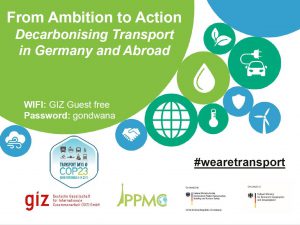
 Transport Climate Strategies in G 20 – How Ambitious Are We?
Transport Climate Strategies in G 20 – How Ambitious Are We? Facilitating Climate Actions in Mobility: Some of Germany’s Contributions Abroad
Facilitating Climate Actions in Mobility: Some of Germany’s Contributions Abroad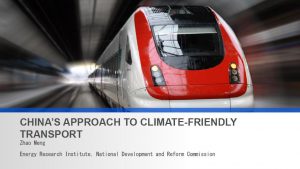 China’s Approach to Climate-Friendly Transport
China’s Approach to Climate-Friendly Transport 100 cities & national governments partner up for sustainable urban mobility development!
100 cities & national governments partner up for sustainable urban mobility development!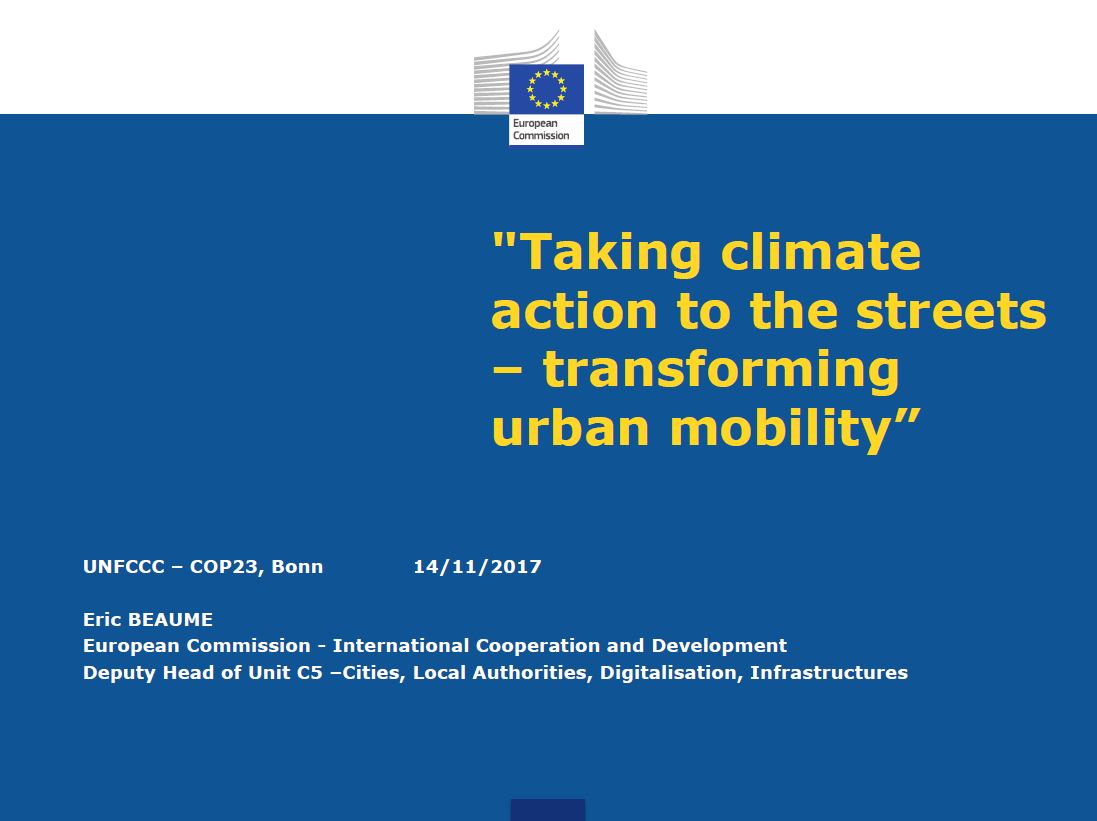 “Taking climate action to the streets – transforming urban mobility”
“Taking climate action to the streets – transforming urban mobility”

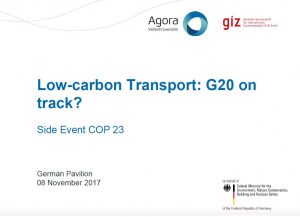 Agenda
Agenda Towards Decarbonising Transport: Taking Stock of G20 Sectoral Ambition
Towards Decarbonising Transport: Taking Stock of G20 Sectoral Ambition The webinar series of the UNFCCC Secretariat and GIZ on Methodologies for GHG Baselines and Monitoring in the Transport Sector comprises eight webinars and is based on the chapters of the UNFCCC Secretariat’s
The webinar series of the UNFCCC Secretariat and GIZ on Methodologies for GHG Baselines and Monitoring in the Transport Sector comprises eight webinars and is based on the chapters of the UNFCCC Secretariat’s 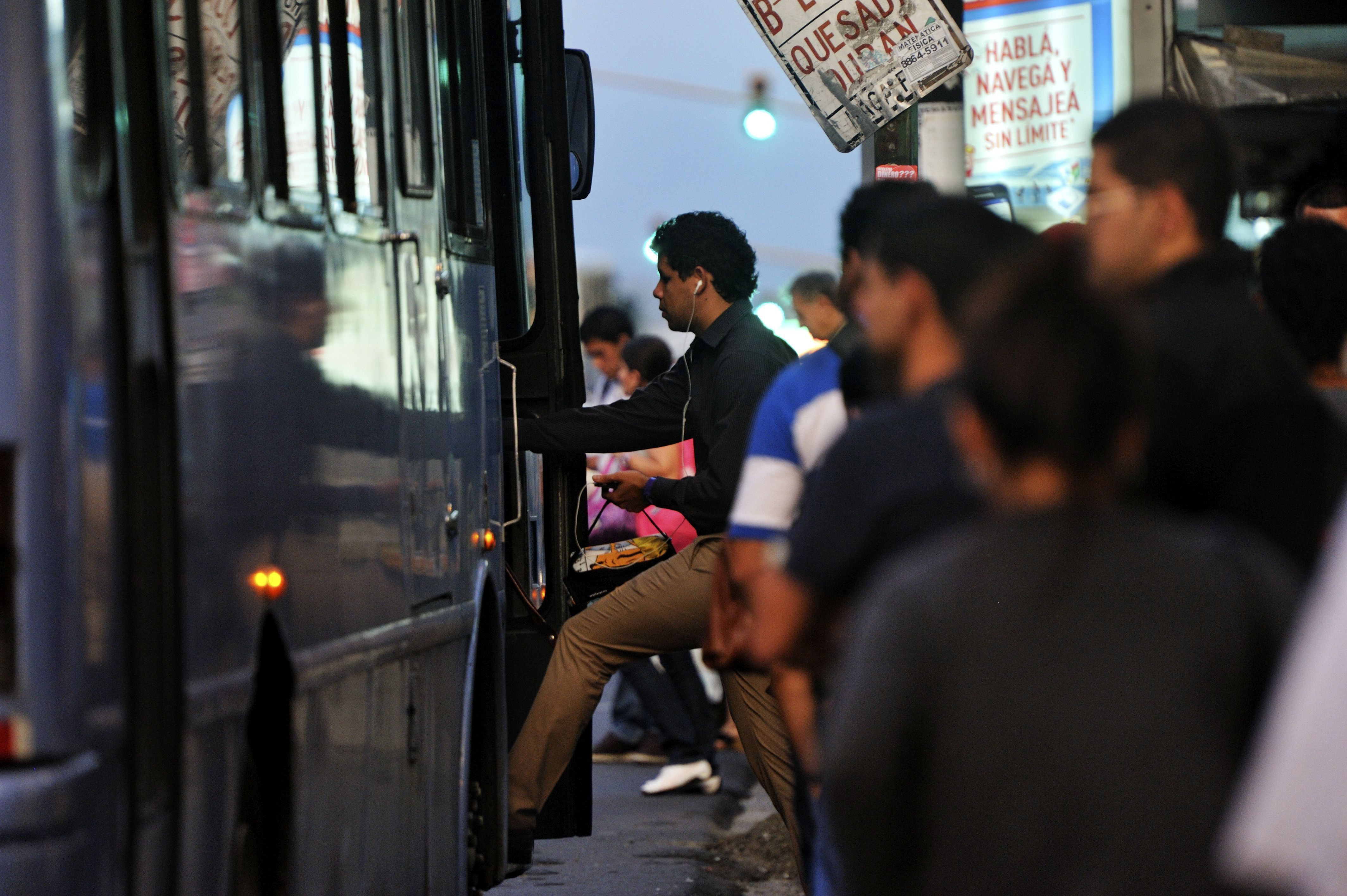
 The Partnership on Sustainable, Low Carbon Transport (
The Partnership on Sustainable, Low Carbon Transport (
